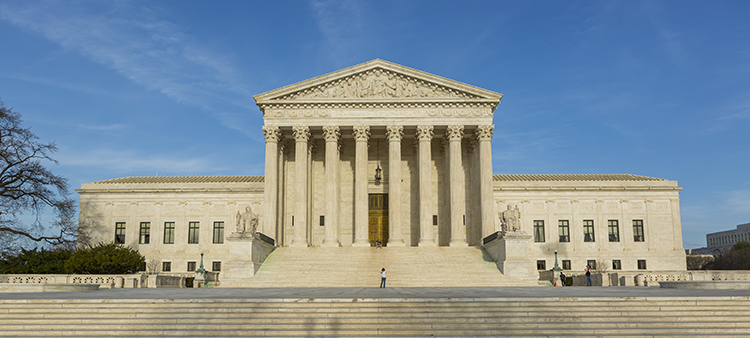Chemerinsky: What will the conservative high court mean for 2019?

Erwin Chemerinsky / Photo by Jim Block.
As a new year begins, it always is tempting to try to forecast what to expect from the U.S. Supreme Court in the months ahead. This year, there seems to be more questions than predictions in terms of what to look for in 2019.
THE TRUMP ADMINISTRATION AND THE COURT
Many initiatives from President Donald Trump’s administration already are poised for Supreme Court review—or will be soon. On Feb. 15, the court will hear oral arguments in a case concerning the Department of Commerce’s choice to include a question about citizenship in the 2020 census. The issue is whether the secretary of commerce can be compelled to testify about the basis for this decision.
The Trump Justice Department has filed a petition for a writ of certiorari asking for review of a decision by the San Francisco-based 9th U.S. Circuit Court of Appeals upholding an injunction against President Trump’s repeal of the Deferred Action for Childhood Arrivals program. An estimated 700,000 to 800,000 “Dreamers” benefit from this program and would face deportation if the Trump action to end it is upheld. The Justice Department also is asking the Supreme Court to review decisions from federal district courts in New York and Washington, D.C., which issued orders enjoining DACA’s repeal.
It is unusual for the Supreme Court to grant review before there is a decision of a court of appeals, but it is permissible under Supreme Court rules and is termed “certiorari before judgment.” The Trump administration also is asking for this type of review on district court rulings enjoining its decision to ban transgender individuals from the military.
Other aspects of Trump’s immigration policies are likely to make it to the Supreme Court in the next year. Several federal district and courts of appeal have held that the Trump administration cannot withdraw federal law enforcement funds from cities and states that fail to cooperate with federal immigration authorities. They have said that this is impermissible commandeering of state and local governments in violation of the 10th Amendment.
Also, in December, a federal district court enjoined the Trump policy to deny consideration for asylum for those who illegally cross the Mexican border. On Dec. 21, the court refused, by a 5-4 vote, to allow the ban to immediately go into effect. Chief Justice John G. Roberts Jr. joined with Justices Ruth Bader Ginsburg, Stephen G. Breyer, Sonia Sotomayor and Elena Kagan to create the majority. But it is an issue that is very likely to return to the court.
And in December, a federal district court in Texas declared unconstitutional the Patient Protection and Affordable Care Act. In 2017, Congress repealed the tax penalty for those who fail to buy health insurance as required by the law. Texas and other states brought a challenge, arguing that this rendered the entire law unconstitutional because the tax penalty was what made the law constitutional as an exercise of Congress’ power. The Trump administration refused to defend the federal law. California and other states intervened to defend the statute. Judge Reed O’Connor accepted the challengers’ argument, but has not yet issued an injunction. There then must be a 5th Circuit review. But it seems likely that the Affordable Care Act will come to the Supreme Court for a third time.
ANOTHER VACANCY?
In his first two years in the White House, President Trump has had two nominees for the Supreme Court confirmed: Neil M. Gorsuch and Brett Kavanaugh. Presidents Barack Obama, George W. Bush and Bill Clinton each appointed two justices, but all served for eight years. Will President Trump have a third seat to fill?
Some are speculating that Justice Clarence Thomas might step down this summer to allow President Trump to pick his successor. Thomas, though, is only 70 years old and could serve for many more years. Also, there is concern about Justice Ginsburg’s health, especially after her recent surgery for lung cancer.
If there is a vacancy, President Trump will be able to nominate someone knowing that the Senate is controlled by Republicans. With 53 Republican senators in the new Congress, Republicans again are likely to be able to confirm anyone President Trump nominates.
PRECEDENT AND THE COURT
As of the end of 2018, there are relatively few potential blockbuster cases on the docket for this term. But there are several cases that pose the issue of whether long-standing precedents should be overruled. In Gamble v. United States, the court is considering whether to overrule decisions concerning double jeopardy which allow the federal and state governments to bring separate criminal prosecutions against the same person for the same crime. In Knick v. Township of Scott, Pennsylvania, the issue is whether the Supreme Court should reconsider the portion of Williamson County Regional Planning Commission v. Hamilton Bank that requires property owners to exhaust state court remedies before federal takings clause claims can be brought. In Franchise Tax Board of California v. Hyatt, to be argued Jan. 9 (and I am counsel for the Respondent Gilbert Hyatt), the sole issue is whether to overrule Nevada v. Hall, which held that a state can be sued in another state’s court. In Kisor v. Wilkie, the court will consider whether to overrule Auer v. Robbins, which held that a court should defer to a federal administrative agency in interpretation of its own rules.
Other cases implicitly raise the issue as to the role of stare decisis. In Gundy v. United States, the question is whether a federal statute—the Sex Offender Registration and Notification Act—should be declared unconstitutional as an excessive delegation of legislative power to the executive branch of government. The Supreme Court last found federal laws unconstitutional on this basis in 1935. Reviving the nondelegation doctrine would be a huge change in the law and potentially open the door to challenges to many federal agencies that operate under statutes with broad delegations of power.
A crucial question that affects so many areas of law concerns the Roberts court’s attitude toward stare decisis. These cases should provide important insight.
WAITING IN THE WINGS
It is a question of when, not if, the court will take up some of the most controversial issues that are pending in the lower courts. May federal courts hear challenges to partisan gerrymandering, and if so, when does it violate the Constitution? These were the issues in Gill v. Whitford last term, but the court did not decide them. May business owners, on account of their religious beliefs, deny service to same-sex couples? This was the question in Masterpiece Cakeshop Ltd. v. Colorado Civil Rights Commission, but it was not resolved by the court. There are many similar cases involving florists and bakers and stationery stores that refuse to service same-sex couples based on the business owner’s religious beliefs.
There are many lower court cases pending that challenge a myriad of state laws that have been adopted imposing restrictions on access to abortion. These seem likely to be before the court in the next year or two and will provide an answer to the question of whether the court, without Justice Anthony Kennedy, will now effectively or explicitly overrule Roe v. Wade.
With Kavanaugh replacing Kennedy, it is unquestionably the most conservative Supreme Court since the mid-1930s. As we move into 2019, it will be the first full year of seeing what this means for the law and for people’s lives.
Erwin Chemerinsky is dean of the University of California at Berkeley School of Law. He is an expert in constitutional law, federal practice, civil rights and civil liberties, and appellate litigation. He’s the author of several books, including The Case Against the Supreme Court (Viking, 2014). His new book, We the People: A Progressive Reading of the Constitution for the Twenty-First Century, was published in November.
Updated at 3:39 p.m. to correct the photo credit.



